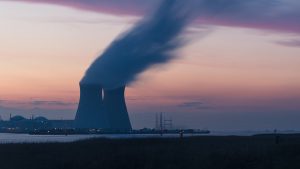PricewaterhouseCoopers, the global business consulting and accounting firm, had a chance to look at the IPCC’s report, set for public release on Friday. Their conclusion?
“Business understands the concept of dealing with risk, and climate change is the mother of all risks that we’ll face this century.”
Given that much of the global economy currently powers itself usingcarbon-emitting fossil fuels, if business understands that climate change is a threat, then what are these big corporations doing about it?
CDP, formerly known as the Carbon Disclosure Project, released a reportthis week that details which of the world’s largest companies are doing the best job to transparently make investments to cut greenhouse gas emissions and prepare for climate change. The report, written by PricewaterhouseCoopers, also found that corporate “climate leaders” doubled since last year, but there is an enormous amount of room for progress.
The non-profit measures the climate transformations of the world’s companies through something it calls the “Climate Disclosure Leadership Index,” a score that rates how companies are cutting carbon emissions, getting ready for the impacts of climate change, and engaging others to lead global efforts to address climate change.
To show leadership in disclosure, a company must publicly share carbon footprint information and risk management strategy, as well as score within the top 10 percent of all S&P 500 companies. Climate Disclosure Leaders include: News Corporation, Home Depot, Bank of America, Johnson & Johnson, Cisco, HP, UPS, as well as energy companies like Entergy, Exelon, Chevron, Hess, and Spectra.
Companies demonstrate performance leadership by publicly disclosing and achieving emissions reductions within the last year, and score well on a number of CDP metrics. Climate Performance Leaders include: Best Buy, Lockheed Martin, Raytheon, Adobe, Cisco, Microsoft, Sprint Nextel, as well as energy companies like Spectra, Entergy, Exelon, and Pepco.
There is some overlap between the two lists, though not enough companies (25, compared to 11 in 2012) are excelling at both disclosing and performing well on these climate scores.
This is the only global disclosure system where companies report environmental impacts to investors. Signatories to the information request include 722 institutional investors representing $87 trillion in combined assets. Most investors were based in Europe, though the list includes Bank of America, BlackRock, Goldman Sachs, Morgan Stanley, and other large financial institutions.
Companies had to disclose more information than last year to be included in the index, and the performance scores among respondents increased 21 percent in 2013.

The report includes self-reporting from more than 5,000 companies across the globe, and more than four out of five of the largest public companies now engage with CDP to allow measurement of their carbon footprints. 334 companies in the S&P 500 submitted information to the report. Almost all disclosed emission footprints, and three out of four reported their emissions targets. Of those, 57 percent met or achieved expected progress toward their targets.
Saving Money
Heather Zichal, Deputy Assistant to President Obama for Energy and Climate, wrote that “the companies featured in this report are taking the kinds of steps the president outlined in his climate plan, showing that environmental protection and economic growth are not at odds.”
Many of these companies are making these outlays to save money. On average, respondents invested 4 percent of their capital expenditure ($50 billion) in reducing emissions, and companies saved $4 billion (and 129 megatons of CO2) in the previous year due to these efforts. Emissions have dropped 6 percent while the stock market and GDP have grown.
As the report notes, “since economic growth resumed, the old notion of emissions reductions and increasing GDP being mutually exclusive has appeared less valid.”
It can also lead to direct savings for companies that do not have a good handle of where operations are most wasteful. Marcus Norton, chief partnerships officer at CDP, said that, “In the mid-2000s when Walmart became involved in CDP, it measured emissions and discovered that it wasn’t their truck fleet that was their biggest source of emissions, it was refrigerants. And that enabled them to take the right action…”
Leadership and Responsibility to Shareholders
Yet there’s also something in reports like these that sets off a competitive spirit among even profit-driven businesses. 98 percent of leaders can assign monetary savings to climate investments. The writing is on the wall, and more and more companies do not want to be left behind. More businesses are disclosing risk to climate exposure, up from 61 percent of respondents last year to 77 percent this year. Companies that link climate change to strategic decisions also make larger numbers of long-term investments.
Shareholders care more now, as well. There was a 46 percent increase in the number of companies that disclosed emissions data in their annual reports. There’s still a long way to go.
In the U.S., just 27 percent of publicly-traded companies even mention the the words “climate change” in their annual reports. This is actually mandatory, stemming from a 40-year-old SEC rule requiring companies to disclose financial risks to their investors. Three years ago, the SEC made clear that climate change was a financial risk that companies must report to shareholders.
In October, companies listed on the London Stock Exchange will berequired to disclose annual greenhouse gas emissions. The United Kingdom will be the first nation to set such a requirement.
What are these companies actually doing? Some, almost entirely in the energy sector, are making investments in lower-carbon projects. Respondents spent $6.6 billion on at least 92 low-carbon energy installations and though natural gas projects were more than a fifth of the total number, solar led the way with 48 projects among all companies. Companies spent $4.6 billion on energy efficiency projects, and $316 million on different transportation options.
Yet the report is missing information from some companies that chose not to disclose what they are doing to address climate change. Just for an example, not all the companies in this graphic from The Climate Group

Some notable absences from CDP: Amazon, Apple, and Facebook chose not to participate at all. And less than half of the companies that do respond chose to respond to questions regarding political activity, specifically on climate policy. The Center for Science and Democracy’s Gretchen Goldman points out that 58 percent of those disclosing political activity admit to influencing public policy through their trade groups. It’s a good first step, but it will be hard to see clearly how policy gets shaped by industry without much higher rates of disclosure from more businesses.
Source: Think Progress. Reproduced with permission









